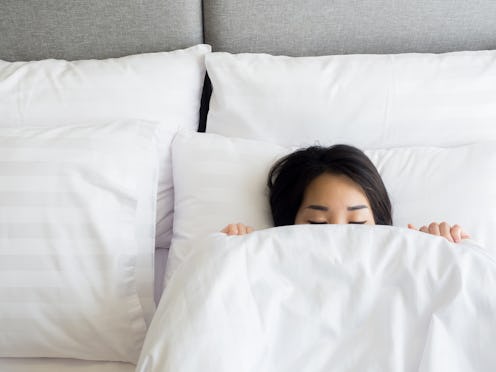It seems like a ton of different ailments can be linked to a lack of sleep (or at least, good quality sleep), from the common cold to a poor metabolism — not to mention the fact that getting a full night's sleep decidedly helps keep up the energy you need to tackle a typical day's to-do list. Still, so many people don't seem to be getting the rest they need, whether it be because of stress, a jam-packed schedule, or simply the fact that they don't know how. Among a whole host of things you can do to catch some much-needed sleep, one thing you might have overlooked is right under your nose. It turns out that a lot of luxury bedding might actually get you to sleep longer and better — and there's a totally legitimate explanation.
You may have already tried to remedy your lackluster sleep situation by doing such things as downloading sleep-inducing apps, re-decorating your space to provide a more tranquil atmosphere, or even revamping your diet to eliminate foods that could be getting in the way, but if you're still laying down on poor quality sheets and pillow cases every night, you could be shorting yourself. Christine Hansen, the so-called "sleep boss" and author behind the online resource and service Sleep Like a Boss, has been helping high achievers (like CEOs, entrepreneurs, athletes, etc.) get the sleep that's essential to being productive and happy on a daily basis — and she's noticed that bedding can make a big difference.
Of course, it's essential to reevaluate certain lifestyle choices (like managing anxiety, for example) but investing in high-quality sheets and shams might be a piece of the puzzle you've been missing. One main reason why some cheaper bedding could be stopping you from better sleep is that it may be made of more toxic materials. "I would definitely go with organic, which at least don’t have all the pesticides inside of the plant," Hansen explains.
And if you're not sold on the toxicity argument, there's still another big reason that certain textiles are getting in the way of your sleep: their physical level of comfort. For example, Hansen advises against buying polyester blends, which are often used for a silky feel. "[Polyester is] synthetic," Hansen says. "It makes you sweat and it’s definitely not something I would recommend, especially if you have skin issues.” Therefore, if that's the feel you're craving, it might benefit you to shell out the extra cash for a 100-percent pure silk set, which is much less likely to cause an irritation, besides the fact that it'll give a luxe feeling against your skin.
Hansen shares that when selecting a type of fabric for your bedding, it's up to personal preference, and she's got her own favorite. “I like linen [sheets] for example," she says. "They're much less of a hassle as well because you don’t have to iron them.” If you're shopping cotton, look for a higher thread count, which will be softer to the touch and will last a lot longer. Once you've figured out the textile you want, Hansen advices searching online (as opposed to in shops) to cast a wide net for your requirements and to perhaps even save a few bucks.
Finally, although the "sleep boss" sees the correlation of expensive bedding and better sleep, she points out that not every luxury brand is created equally. "You also have high end brands that are manufactured in similar factories as average ones, so if there’s no indication that it’s been pre-washed and certified more toxin-free there isn’t a big difference," she says. Ahead, find a few sets and pieces that follow her advice, including those made of organic materials, those pre-washed and garment dyed with non-toxic materials, and those made of natural fabrics that are breathable and soft to the touch.
